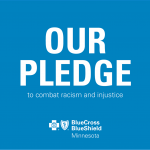Blue Cross’ Indigenous Peoples Resource Group emphasizes importance of education
October 20, 2020At Blue Cross, we are focused on achieving racial and health equity as a means of inspiring change, transforming care and improving the health of all. Specifically, we want to shed light on health within Black, Indigenous, People of Color (BIPOC) communities. These discussions are intended to provide a safe space for associates to share their lived experiences and ideas on how health needs, challenges and opportunities within BIPOC communities can be better addressed at all levels.
 In honor of Indigenous Peoples Day, Blue Cross and Blue Shield of Minnesota, through the leadership of our Indigenous Peoples Associate Resource Group, has taken a deep dive into racial and health disparities experienced by Native people.
In honor of Indigenous Peoples Day, Blue Cross and Blue Shield of Minnesota, through the leadership of our Indigenous Peoples Associate Resource Group, has taken a deep dive into racial and health disparities experienced by Native people.
Also from this series:
- Blue Cross recognizes Indigenous Peoples' Day 2020
- Historical trauma and mental health in Indigenous communities
For this post in the series, we are taking a look at how the lack of knowledge that many people have about the culture and history of Indigenous Peoples, as well as broken treaty agreements, has exacerbated health inequities within Native communities.
The issue of invisibility
According to the Reclaiming Native Truth project— the largest public opinion research project ever conducted by and for Native peoples— the vast majority of Americans said they know little to nothing about Native Americans. Many Americans form their opinions about Native Americans from harmful stereotypes and do not know how Native peoples live today.
Unfortunately, our education system has largely failed to properly teach students about the contributions of Native Americans or the issues impacting Native peoples today. All too often, students have learned to see Native peoples as only existing in the past, and the vast majority of educational curriculum completely erases the voices and contributions of Native peoples to our society.
At Blue Cross, we are working with Native communities across Minnesota to achieve a more equitable future and invest in work led by Native peoples to address health inequities.
The invisibility of contemporary Native peoples has, in turn, fueled harmful biases across our society, including institutions that are integral to the health of Native peoples. The lack of accurate representation and understanding of Native peoples has caused significant barriers to work toward equity and racial justice.

Stories and perspectives of Native people
Research tells us that 78 percent of Americans are interested in learning more about Native cultures and that strong majorities support Native positions on most issues when presented with accurate narratives. Toward this goal, two important topics to understand are tribal sovereignty and treaty rights.
Tribal Sovereignty
Federally recognized tribes in the United States are distinct political entities with the right to self-govern. The U.S. Constitution recognizes tribes as distinct governments with the power to regulate their internal affairs. The U.S. federal government holds a government-to-government relationship with Tribal nations. Tribal nations have their own government, complete with law enforcement and court systems.
“Indian Nations had always been considered as distinct, independent political communities, retaining their original natural rights, as the undisputed possessors of the soil… The very term “nation” so generally applied to them means ‘a people distinct from others.’”
Treaty Rights
Treaties are legally binding contracts between sovereign nations, recognized in Article Six of the U.S. Constitution as “the supreme law of the land.”
From 1778 to 1871, the United States government signed 370 treaties with numerous Indigenous nations. In many of these treaties, tribal nations ceded title to land in exchange for a guarantee of safety from violence at the hands of U.S. government, monetary payments, the definition of land boundaries and the preservation of hunting and fishing rights for themselves and future generations.
Treaties are legally binding and do not expire with time. Unfortunately, most treaties have not been honored by the U.S. government. The United States Commission on Civil Rights report, Broken Promises: Continuing Federal Funding Shortfall for Native Americans, evaluated the federal government’s commitments to support the well-being and sovereignty of Native American nations and found that the U.S. government has not adequately followed through on federal trust and treaty obligations regarding numerous issues.
Creating an equitable future for Native communities
It is important to understand treaty rights because they are foundational to the U.S. Constitution and the government’s legal obligations to Native nations. Not honoring treaties means that tribes do not have the resources guaranteed for essential services like housing, health care and education.
While treaties mandate the federal government provide healthcare, more than a century of underfunding— along with the loss of traditional foods and lifeway— means American Indians face tremendous systemic barriers to achieving health equity.
This article from Vox shares thoughts from Native leaders on this topic. In it, Karen Diver, Fond du Lac Band of Lake Superior Chippewa, director of business development of Native American Initiatives at the University of Arizona, comments that “while there are many issues that contribute to negative health indicators in Indian Country, the chronic lack of funding for the Indian Health Service only makes matters worse.”
Learning more about the contributions, histories and lived experiences of Native people is an important way to start to see the systemic injustices Native communities experience. It is a way to look beyond the statistics and start to see the root causes of the inequities Native people face.
Blue Cross’ commitment to combating racial injustice
 Blue Cross and Blue Shield of Minnesota has long supported many organizations working hard to break through these barriers to achieve racial and health equity for Native people. We covered a look at this in an earlier blog post in this series.
Blue Cross and Blue Shield of Minnesota has long supported many organizations working hard to break through these barriers to achieve racial and health equity for Native people. We covered a look at this in an earlier blog post in this series.
And, in June, the executive leadership team at Blue Cross and Blue Shield of Minnesota pledged to combat racism and injustice. This commitment starts with understanding how systemic racism manifests itself in our society and what we can do to address it. Read our commitment.
Learning about Native peoples, rethinking past assumptions and gaining understanding of how to be an effective ally are all important steps to combat racial injustice.
Read more
To go deeper on these topics, visit the following resources:
National Congress of American Indians, the oldest, largest and most representative American Indian and Alaska Native organization serving the broad interests of tribal governments and communities.
Why Treaties Matter, a supplement to Why Treaties Matter – Self Government in the Dakota and Ojibwe Nations, a travelling exhibit on treaties between Dakota and Ojibwe people and the United States. The project is a collaboration of the Minnesota Indian Affairs Council, the Minnesota Humanities Center and the Smithsonian Institution’s National Museum of the American Indian.
The National Indian Education Association, which advances comprehensive, culture-based educational opportunities for American Indians, Alaska Natives, and Native Hawaiians.
Of note: Illuminative has partnered with the National Indian Education Association (NIEA) to create digital lesson plans and resources about Native American culture, history and contemporary life for more than one million students and families learning at-home. Free lesson plans and activity guides are available for students from Pre-K through 8th grade.
Sasha Houston Brown (Mdewakanton Dakota) chairs the Indigenous Peoples Associate Resource Group at Blue Cross.

